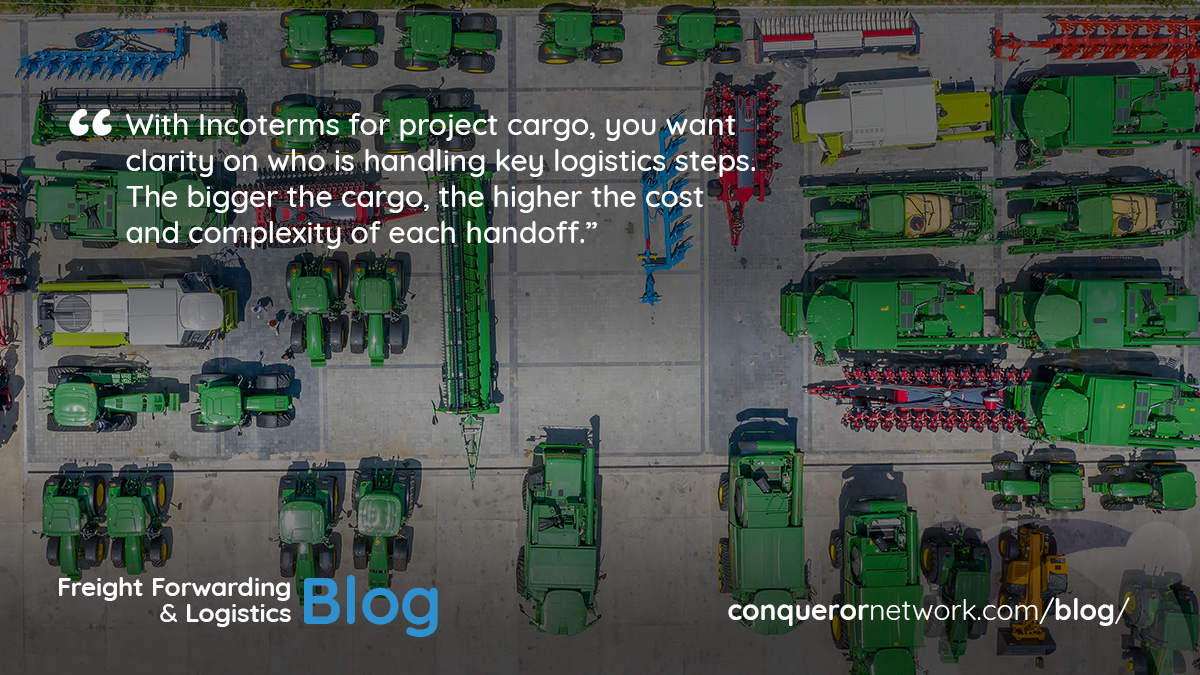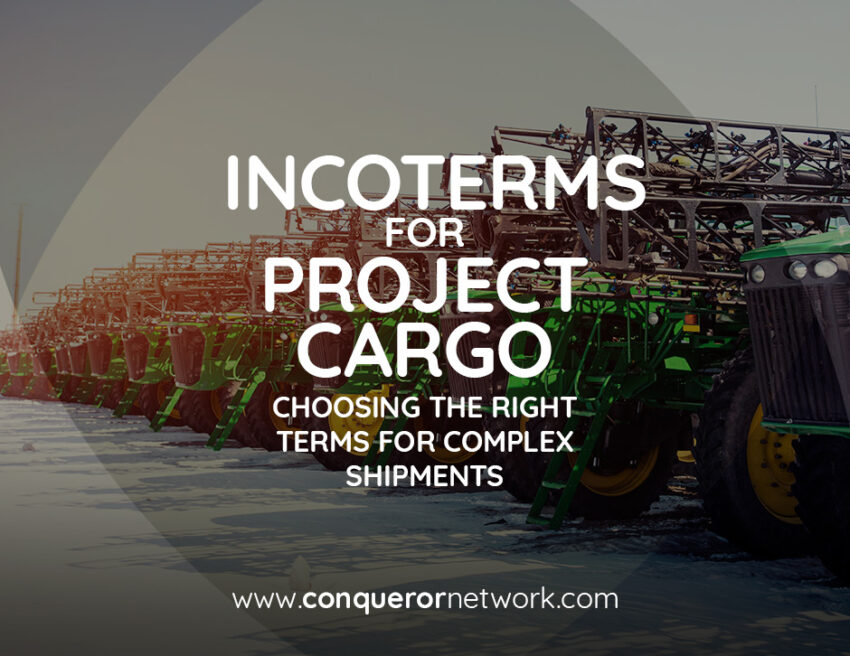When you’re dealing with oversized, heavy, or high-value cargo, the stakes are higher. One mistake in documentation, one misunderstanding about who’s responsible for what, and your entire shipment could stall at the port or worse, cost you thousands. That’s why choosing the right Incoterms for project cargo isn’t just a technicality. It’s a strategic decision that impacts risk, cost, timing, and accountability. Let’s break down which Incoterms make sense for complex moves and how freight forwarders and shippers can navigate this decision with confidence.
What makes project cargo different?
Project cargo involves the transportation of large, heavy, or high-value pieces of equipment. Think wind turbine blades, industrial generators, oil rig components, or construction machinery. These shipments often involve multiple transport modes, tight timelines, customized packaging, and route planning. They’re rarely straightforward. Because the logistics are more demanding, so are the contractual terms. You can’t afford to leave room for interpretation on who covers what, insurance, handling, export clearance, import duties, or delivery to remote sites. That’s where Incoterms come in. Published by the International Chamber of Commerce, Incoterms are standardized trade terms that clearly define the responsibilities of buyers and sellers in international transactions. But not all Incoterms are created equal when you’re moving 80 tons of equipment across continents.

Why the right Incoterms matter for project Cargo
Choosing the wrong term can lead to delays, unexpected costs, or even legal disputes. For example, using EXW (Ex Works) for project cargo may seem simple, but it pushes all responsibility onto the buyer, including picking up cargo from the seller’s facility and arranging export formalities. That works fine for small shipments. But for a multi-million-dollar transformer? Not ideal. With Incoterms for project cargo, you want clarity on who is handling key logistics steps. The bigger the cargo, the higher the cost and complexity of each handoff.
Here’s what to consider when selecting an Incoterm:
-
Who controls the transport chain?
-
Who can better manage local risks and port handling?
-
Which party has experience with local customs regulations?
-
How are insurance and risk transfer structured?
The answers will help you narrow down the right term for your shipment.
Best Incoterms for project cargo: CPT, DAP, DDP, and FCA
Some Incoterms are better suited than others when it comes to project cargo logistics. Let’s look at a few that offer flexibility, clarity, and real-world advantages.
FCA (Free Carrier)
FCA is often the most practical starting point for complex cargo. The seller delivers the goods, cleared for export, to a carrier or another party nominated by the buyer. The advantage of FCA is that it works well with multimodal transport. It’s also one of the few terms that lets buyers issue a Bill of Lading with an onboard notation, even if the cargo is handed over before loading on a vessel. FCA puts responsibility for the main leg of transport on the buyer but ensures the seller clears export procedures. This balance works well when buyers have preferred forwarders or need tighter control over the shipping timeline.
CPT (carriage paid to)
CPT is a logical choice when the seller wants to retain control over the main transportation up to a named destination but shift the risk once the cargo is handed over to the carrier. For project cargo, this term is particularly effective when sellers have strong transport partners and can secure better rates, or prefer to handle logistics to minimize delays. Therefore, it’s essential to remember that, under CPT, the risk transfers earlier than the cost responsibility. Therefore, if the cargo is damaged during transport, the buyer bears the risk, even though the seller has paid for the shipping.
DAP (delivered at place)
DAP makes sense when the seller agrees to handle the entire journey and deliver the cargo to the buyer’s location. This is useful for remote project sites where unloading and inland transport are just as complex as port handling. For freight forwarders, DAP gives you a chance to offer end-to-end logistics services, including port clearance, overland transport, and specialized delivery equipment.
DDP (delivered duty paid)
DDP is the most comprehensive Incoterm from the buyer’s perspective. The seller handles everything: export clearance, freight, import clearance, duties, and delivery. It’s a lot of responsibility, but it simplifies things for the buyer, especially if they’re unfamiliar with the destination country’s rules. For project cargo, use DDP with caution. It requires the seller to have deep knowledge of destination customs and taxes. It also increases exposure to cost fluctuations.
Incoterms to avoid for complex cargo
Some Incoterms don’t make sense for project cargo. For example:
-
EXW (Ex Works): It leaves too much on the buyer, including export clearance, which may not be realistic if they’re in another country.
-
FOB (Free On Board): FOB is designed for bulk sea cargo, not containers or complex equipment. It’s often misused in container shipping and can create confusion about when liability shifts.
-
CIF and CFR: While common, these terms only work for ocean transport and limit flexibility when multiple transport modes are involved.
With project cargo often requiring combinations of sea, road, and sometimes air or rail, stick with terms that cover multimodal transport.
Incoterms for project cargo: Key tips
-
Negotiate early. Don’t treat Incoterms as boilerplate. Discuss them upfront in your quote or proposal stage.
-
Get everything in writing. Incoterms define responsibilities, but you should spell out specific actions in your commercial contracts.
-
Include named places. Always specify the exact location. Saying “DAP India” is too vague. Use “DAP Jobsite, Chennai, India.”
-
Work with experienced forwarders. When dealing with heavy-lift or over-dimensional cargo, it pays to have a logistics partner who knows how to handle the handoffs at every stage.
Final Thoughts
Choosing the right Incoterms for project cargo is a tactical move. It defines who does what, when, and how much they pay for it. The wrong term can lead to surprises and disputes. The right one creates transparency, efficiency, and a smoother experience for everyone involved. If you’re shipping turbines, cranes, or any kind of industrial machinery, don’t just settle for the default. Evaluate the Incoterm that matches your cargo type, transport plan, and business relationship. Get it right, and you’ll avoid delays, save money, and build trust with clients who’ll keep coming back.


